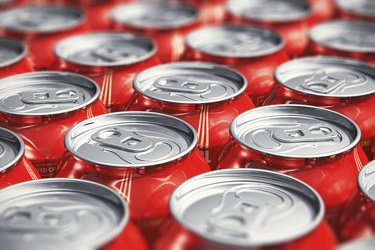
Most soft drinks contain one or more of three common acids: citric acid, carbonic acid and phosphoric acid. Soft drinks with specific flavor ingredients may also contain other less common acids. The level of acidity in sodas can be quite high, and many dentists deplore its long-term effect on your teeth.
The Most Common Acids
Video of the Day
The three most common acids in soft drinks are citric, carbonic and phosphoric acids. Citric acid comes from citrus products and any soft drink with citrus flavoring will contain it. The chemical formula is H(3)C(6)H(5)O(7). Carbonic acid forms from dissolved carbon dioxide, which is present in almost all soft drinks. The chemical formula is simply a combination of water's H(2)O and the CO(2) of carbon dioxide, which makes H(2)CO(3). Soft-drink makers often add phosphoric acid to colas to produce a sharp flavor and to slow the growth of mold and bacteria. Most of the acidity in colas comes from phosphoric acid, whose chemical formula is H(3)PO(4).
Video of the Day
Others
Some sodas contain acids in addition to the three most common ones. Malic acid is present in some fruits and their juices and makers of noncarbonated drinks sometimes add quantities of it for flavor and as a preservative. For similar reasons, some fruit drinks contain fumaric acid as an additive.
Acidity
The indicator of a substance's acidity is the relative concentration of hydrogen ions as measured by its pH. The pH scale is logarithmic; zero is the most acidic and 7.0 is completely neutral. Pure water has a pH of 7.0. Each round number on the scale represents ten times the amount of acidity of the previous number. Colas measure about 2.5 on the pH scale. Battery acid by comparison has a pH of about 1.0, which is more acidic than the most caustic soft drinks by a factor of 30. Root beer is the least acidic of sodas: it does not contain phosphoric acid and is typically less carbonated.
Effects
The effects of acidity in soft drinks may be more damaging to teeth than the sugar they contain. Industrial users of phosphoric acid apply it to steel parts in order to strip them to bare metal before being painted. The Academy of General Dentistry warns that the acid levels in soft drinks can cause damage to teeth and recommends that their intake be limited, especially for children.